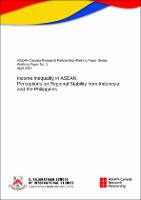| dc.description.abstract | Income inequality has been a growing concern since Global Financial Crisis. But how do regional institutions contribute to the debate on income equality? ASEAN’s normative framework is underpinned by the principle of non-interference while ASEAN has a mandate to establish an equitable economic community post 2015. This study examines if regional income inequality is considered a regional problem, and if so, is the concern significant enough to overcome the principle of non-interference allowing ASEAN to play a greater role in policy formation. In section one, analysis on income inequality within ASEAN demonstrates that the current income gap is between the wealthiest countries and the other member states not the ASEAN-6 and the CLMV. Overall, ASEAN is characterised by increasing income inequality, convergence on human development, and increasingly poor governance and institutional quality. Section two presents a survey of policy makers in Indonesia and the Philippines. The survey objectives are to gather quantitative and qualitative data on perceptions of income inequality and institutional effectiveness specifically to understand perceptions on ASEAN’s activities under the Narrowing the Development Gap (NDG) initiative. This study concludes that with deepened regionalism post-2015, policy makers recognise the concern over regional instability due to disparities in income inequality. Concern over instability creates institutional demand for ASEAN policies. At a normative level the realisation of the ASEAN Economic Community (AEC) seeks to support inclusivity in Indonesia and the Philippines’ national economic institutions. This paper recommends that the ASEAN Secretariat explicitly monitor income inequality so indicators under the NDG initiative are measured against trends in income inequality to facilitate discussions on how to maximize regional stability. Institutionally, ASEAN must promote the uptake of a local normative framework on how to rationalise and manage income inequality in order to sustain long-term stability and prosperity. | |

